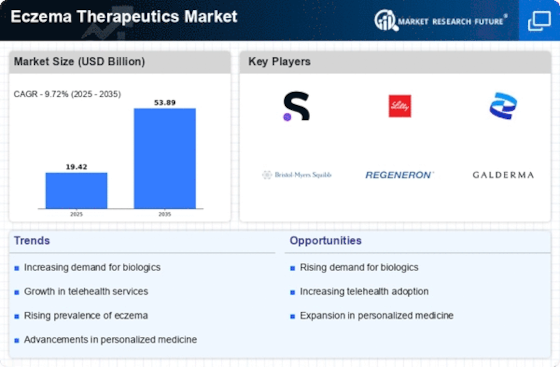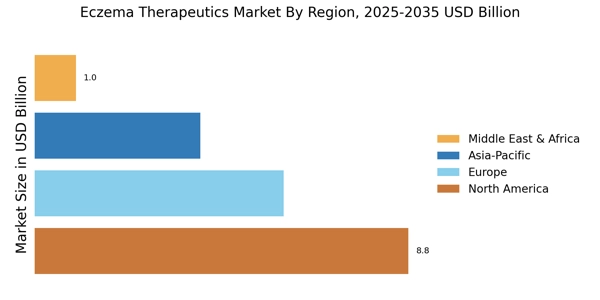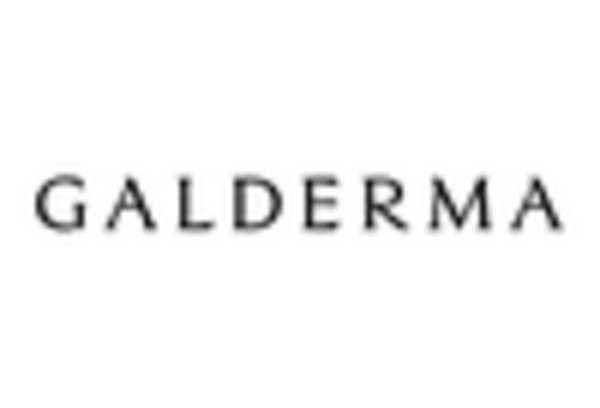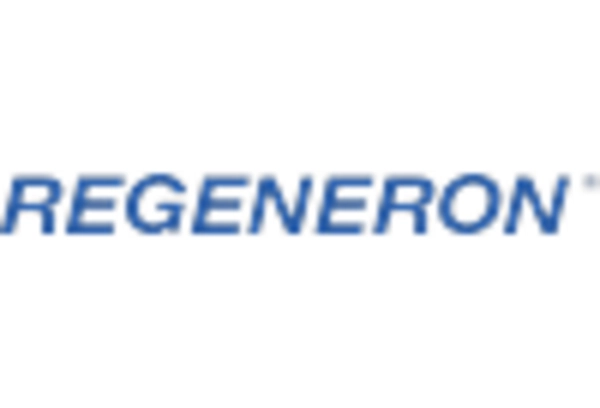Growing Prevalence of Eczema
The rising incidence of eczema is a pivotal driver in the Eczema Therapeutics Market. Recent estimates indicate that eczema affects approximately 10-20% of children and 1-3% of adults, leading to an increased demand for effective treatment options. This growing prevalence is attributed to various factors, including environmental changes, lifestyle modifications, and genetic predispositions. As more individuals seek relief from the symptoms of eczema, pharmaceutical companies are compelled to innovate and expand their product offerings. This trend not only enhances the market landscape but also encourages research and development initiatives aimed at discovering novel therapeutic agents. Consequently, the Eczema Therapeutics Market is poised for substantial growth as healthcare providers and patients alike seek effective solutions to manage this chronic condition.
Increased Awareness and Education
The heightened awareness surrounding eczema and its management is a crucial driver for the Eczema Therapeutics Market. Educational initiatives aimed at both healthcare professionals and patients have led to a better understanding of the condition, its triggers, and available treatment options. This increased awareness encourages individuals to seek medical advice and explore therapeutic alternatives, thereby driving demand for eczema treatments. Moreover, patient advocacy groups play a vital role in disseminating information and promoting research funding, which further supports the development of new therapies. As awareness continues to grow, the Eczema Therapeutics Market is expected to expand, with more individuals actively seeking effective solutions to manage their eczema symptoms.
Regulatory Support for New Treatments
Regulatory bodies are increasingly supportive of the development and approval of new eczema therapeutics, which serves as a significant driver for the Eczema Therapeutics Market. Streamlined approval processes and expedited pathways for innovative treatments have emerged, allowing companies to bring their products to market more efficiently. This regulatory environment encourages investment in research and development, as pharmaceutical companies are more likely to pursue novel therapies with the assurance of a favorable approval process. Additionally, the focus on patient-centric approaches in regulatory frameworks emphasizes the need for effective and safe treatments, further stimulating market growth. As a result, the Eczema Therapeutics Market is likely to benefit from a steady influx of new and improved therapeutic options.
Rising Demand for Personalized Medicine
The shift towards personalized medicine is becoming increasingly prominent in the Eczema Therapeutics Market. Patients are seeking tailored treatment plans that consider their unique genetic, environmental, and lifestyle factors. This trend is driving pharmaceutical companies to invest in research that focuses on understanding the individual variability in treatment responses. Personalized approaches, such as targeted biologics and customized topical therapies, are gaining traction as they offer the potential for improved efficacy and reduced side effects. As healthcare providers adopt more individualized treatment strategies, the Eczema Therapeutics Market is expected to expand, with a growing emphasis on developing therapies that cater to the specific needs of patients.
Advancements in Therapeutic Technologies
Technological advancements in the development of eczema therapeutics are significantly influencing the Eczema Therapeutics Market. Innovations such as biologics, topical agents, and systemic therapies have emerged, providing new avenues for treatment. For instance, the introduction of monoclonal antibodies has revolutionized the management of moderate to severe eczema, offering targeted therapies that address the underlying inflammatory processes. Furthermore, the integration of digital health technologies, including telemedicine and mobile health applications, facilitates better patient monitoring and adherence to treatment regimens. These advancements not only improve patient outcomes but also stimulate market growth by attracting investments in research and development. As a result, the Eczema Therapeutics Market is likely to witness a surge in new product launches and an expansion of treatment options available to patients.

















